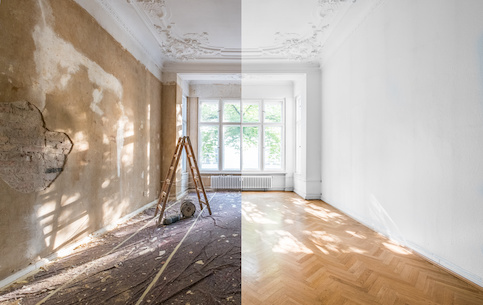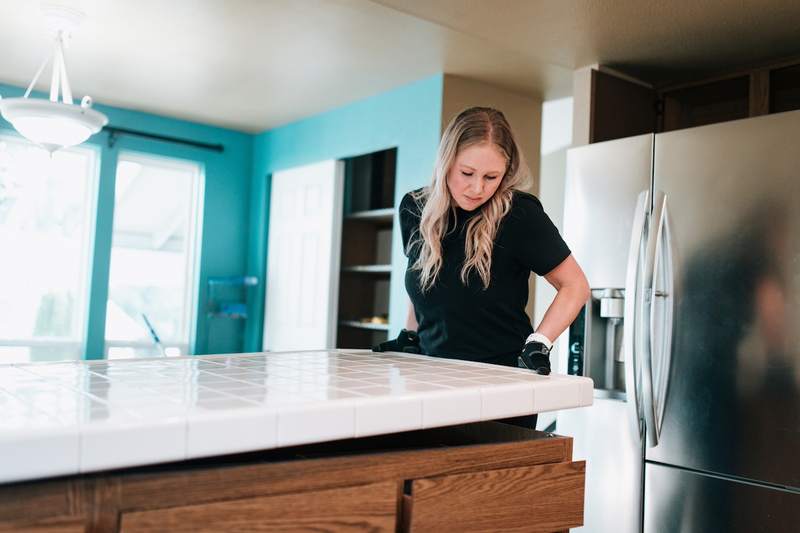When moving into a home, you want to make sure you’ll be living in a safe environment. FHA loans ensure that home buyers are finding a home that’s safe to inhabit according to FHA minimum property standards. Although a possible hurdle to homeownership, these standards protect you from walking into a frustrating or even dangerous living situation.
Find out if an FHA loan is right for you.
See rates, requirements and benefits.
What Are The FHA’s Minimum Property Standards?
If you want to use an FHA loan to purchase a property, it must adhere to the minimum property standards set by the Federal Housing Administration, or FHA.
The FHA’s three requirements are that a property must be safe, secure, and structurally sound to qualify for one of their loans. Properties cannot have adverse conditions that might imperil the homeowner, and must meet proper building codes.
As a buyer, these standards protect you from buying an unsafe property. But the standards also help lenders avoid potentially risky investments.
See What You Qualify For
Buy A Home
Discover mortgage options that fit your unique financial needs.

Refinance
Refinance your mortgage to have more money for what matters.
Tap Into Equity
Use your home’s equity and unlock cash to achieve your goals.
The Basics Of FHA House Requirements: Safety, Soundness And Security
A property must meet the following three requirements to qualify for an FHA loan.
- Safe: The property should provide a safe structure without any health or safety hazards present.
- Sound: The home must be structurally sound to provide a livable environment for its inhabitants. This means the foundation needs to be properly graded, your roof can’t be caving in, etc.
- Secure: The property must provide a secure environment for its inhabitants. Entrances to the home should be properly secured and in working order, as should windows.
If a property doesn’t meet these three conditions, the lender will have questions about its resale value. Since the FHA needs to know that the property will hold its value, a property that doesn’t meet these requirements won’t pass the test.
Common Safety, Soundness And Security Issues
The reality is, many properties don’t meet the FHA minimum standards. If you are counting on an FHA loan, the requirements can narrow your options. Here are a few common issues that would disqualify a property from an FHA loan.
- Electrical: The electrical system must be up to code and provide adequate lighting.
- Heating: The heating systems must follow the local code and provide a comfortable temperature. Any unconventional heating systems, like space heaters, must also follow local guidelines.
- Roofs: The roof must provide protection from moisture and have a reasonable lifespan left.
- Attics: Attics must have proper ventilation to allow heat to escape.
- Water and plumbing: Plumbing must be accessible for repair, there cannot be standing water without proper grading away from the home and there must be enough hot water for drinking and sanitary needs.
- Pest Infestations: Any pest infestations must be dealt with, but some can be a dealbreaker. For example, a termite infestation could lead to an unsafe structure and can cause a failed inspection.
- Hazards: Health hazards cannot be present. A few include radioactive materials, pollution, inadequate drainage, excessive noise, etc.
Find out if an FHA loan is right for you.
See rates, requirements and benefits.
How Do FHA Minimum Property Requirements Work?
The FHA minimum property requirements are set by the Department of Housing and Urban Development (HUD). These requirements make for a pretty long list. The good news is that you don’t have to keep track of everything yourself. Instead, an FHA-approved appraiser will give a home inspection.
During the FHA appraisal, the appraiser will document their findings in a report for the lender. Generally, the report is broken down into cosmetic repairs and required repairs.
While required repairs are necessary to finalize an FHA loan, cosmetic repairs do not threaten your safety or health. After receiving the inspection report, the lender will determine what repairs are required to move forward with the FHA loan. Only required repairs, which present a threat to safety or security, will halt the loan process.
FHA Home Requirements For The House’s Exterior
The FHA requires specific criteria for the house’s exterior. Here’s a closer look at the basic requirements.
Street Access
The property must have direct street access. If you have to cross through another property to gain access, the FHA won’t allow the loan to move forward.
Proper Water Drainage
A lack of proper water drainage is a significant safety hazard. If water is draining toward the home, flooding and mold issues are common. The FHA requires proper water drainage away from the home.
Safety Hazards
Safety hazards outside of the home, like an uneven driveway, could disqualify a home from an FHA loan.
A Structurally Sound Roof
The roof must be structurally sound and have at least 2 years of life remaining. If there are missing shingles or other flaws, that could stop the loan process.
FHA Home Requirements For The House’s Interior
If the exterior of the home passes muster, the interior must also be deemed safe and secure. Here’s a look at a few of the requirements.
Sufficient Living Space
The home must contain sufficient living space for its inhabitants. Although the size required varies, the home must provide enough sleeping space and adequate room for eating. So, the amount of space required for a family of five is more than a single homeowner.
Sanitary Water Supplies
Sanitary water supplies are a must. The home must provide access to non-polluted drinking water and a sewage disposal system. Additionally, there must be a source of hot water available.
Utilities In Good Condition
Utilities, such as water, sewer, gas and electricity must be in good condition. Additionally, a unit must have its own utility connection. For example, if buying a townhome, utility services must be available as individual meters.
Adequate Crawl Space
Crawlspaces must provide enough room for inspection without any debris. Proper ventilation in the attic and basement is also required. If the inspector finds any mildew or mold in the crawl space, that could be a dealbreaker.
How Are FHA Property Requirements Enforced?
The FHA appraisal by a qualified professional serves as the enforcement of property requirements. The inspector will create a detailed report of any potential red flags. If anything doesn’t meet the minimum property requirements, the lender won’t move forward with the loan.
Why Do FHA Minimum Standards Exist?
The FHA minimum standards exist for two reasons.
The main goal of the standards is to ensure that a home is safe, secure and sound. This confirmation allows the home to be insured. Lenders require homeowners insurance to protect their investment, so this is a critical piece of the puzzle.
As a bonus, the minimum standards also protect borrowers. With these in place, you won’t move into a home with safety hazards.
Where Can You Find FHA Minimum Property Requirements And Standards?
If you want to use an FHA loan, it helps to understand the minimum property requirements and standards. With this information in your back pocket, you can quickly eliminate properties that don’t meet the requirements.
The U.S. Department of Housing and Urban Development offers a detailed look at the requirements in this document. But another helpful resource is your real estate agent. If they are used to working with FHA homebuyers, their experience can help you avoid homes that won’t meet the requirements.
The Bottom Line
The FHA will not approve home loans for properties that don’t meet the minimum property standards set by HUD. Before you jump into the house hunting process, establishing a basic understanding of the requirements will help you avoid getting your heart set on a home that doesn’t meet the standards.
Ready to move forward with your FHA home loan? Find out more about the credit requirements for an FHA loan today.
Find out if an FHA loan is right for you.
See rates, requirements and benefits.

Sarah Sharkey
Sarah Sharkey is a personal finance writer who enjoys diving into the details to help readers make savvy financial decisions. She’s covered mortgages, money management, insurance, budgeting and more. She lives in Florida with her husband and dog. When she's not writing, she's outside exploring the coast. You can connect with her on LinkedIn.












